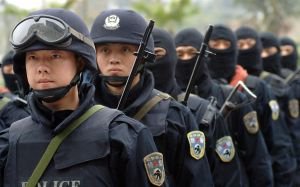
Generals pledge to bolster China's paramilitary police
By Mark Magnier
Beijing (Los Angeles Times) 13 Jan. 2006 - In a sign of the government's growing concern over unrest at home and the rise of hostile forces "surrounding China," two senior generals pledged Thursday to boost the combat effectiveness of the nation's 1-million-strong paramilitary police.
Since the widely condemned 1989 Tiananmen Square crackdown that saw soldiers shoot at unarmed civilians, China's Communist Party has taken aggressive steps to beef up the People's Armed Police (PAP).
Analysts say that over the past 15 years, Beijing has poured resources into the paramilitary force, manned it with former soldiers and officers, and boosted training, budgets and weaponry. The moves are designed to provide an alternative to the use of army troops should things get out of control.
The PAP should "become an extremely combat-effective force to deal with sudden incidents," wrote Commander Wu Shuangzhan and Political Commissar Sui Mingtai in Qiushi, a twice-monthly publication of the party's governing Central Committee.
While much of Thursday's article was devoted to the need for greater vigilance against terrorists, saboteurs and other threats to national security, the article also cited the police force's need to maintain stability in the face of "large-scale mass incidents," a reference to the growing problem of civil unrest.
China had 74,000 protests, riots and related disturbances in 2004, compared with 58,000 in 2003, according to government figures.
In a November video presentation, the Ministry of Public Security identified several threats to national stability, according to Chinese academics, that are echoed in the article.
Among these were growing anger and angst among Chinese as social pressure ratchets up; clashes among domestic groups over corruption, land seizures and the growing gap between rich and poor; and conflicts involving groups Beijing identifies as enemies on its periphery. The latter includes those who advocate independence for Tibet, Taiwan and the far western province of Xinjiang, sometimes referred to as "East Turkestan," as well as members of the Falun Gong religious group and Tiananmen protesters who fled overseas.
Analysts said it has become increasingly difficult for local police to handle the growing number of conflicts, given limitations on their weapons and manpower, leading to calls for a stronger paramilitary force.
"Compared to normal police, the paramilitary police are designed to safeguard social stability through the use of compelling force if necessary," said He Husheng, a professor of Communist Party history at Beijing's Renmin University. "We learned from Tiananmen what happened when we used the army, which was not proper."
While the number of mass incidents is rising sharply, Chinese analysts said they doubted these conflicts would lead to a political crisis.
"Although the number of demonstrations is large, most of the participants have no political intentions," said Wang Yukai, a professor with the National School of Administration in Beijing. "Most of the unrest is caused by a mishandling of the people's interests, but the demonstrators don't want to overthrow the government."
Wang added that, rather than using paramilitary force on Chinese citizens, the government is addressing many causes of dissatisfaction by paring rural taxes, channeling more help to the disadvantaged and boosting medical services in the countryside.
The article also took a swipe at "Western hostile forces" that aim to spread foreign values to break apart the country. Officials have suggested that charities and other civic groups supported by foreigners are fomenting democracy to undermine Communist Party control.
China retains a deep-seated suspicion of foreign influence dating back to the 1839-42 Opium Wars, when superior foreign forces forced it to open its markets and buy opium.
No comments:
Post a Comment